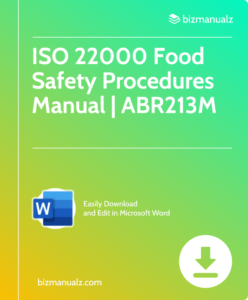What’s the Difference Between ISO vs. FDA?

ISO is an international organization that sets standards to make sure products and services are safe, reliable, and consistent. It offers certification to show a company’s commitment to quality assurance, giving it a competitive edge. What’s the difference between ISO vs. FDA?
Preparing Difference Between ISO vs. FDA
The FDA, however, is distinct. It’s a US agency responsible for public health safety. It enforces regulations on food, drugs, medical devices, and cosmetics to ensure they meet certain standards before being released to consumers.
ISO certification and FDA approval are both signs of quality assurance, but for different reasons. ISO certification is recognized globally, whereas FDA approval is required in the US market.
ISO was created in 1947 to help with international trade after WWII. The FDA, however, goes back to 1906, when President Roosevelt signed the Pure Food and Drugs Act to regulate food labeling and drug purity. Over the years, the FDA’s power has grown to become a major player in protecting public safety.
Purpose of ISO:
ISO, or International Organization for Standardization, helps ensure global standards are in place across various industries. Its mission is to promote consistency and quality of products, services, and systems worldwide.
Let’s take a look at the table to find out more about ISO objectives and contributions:
| Objective | Contribution |
|---|---|
| Quality Management | ISO provides guidance on building effective quality management systems that enhance customer satisfaction and comply with regulations. |
| Environmental Management | ISO assists in creating environmentally sustainable practices, shrinking carbon footprints and aiding a greener future. |
| Occupational Health & Safety | ISO standards help protect employee well-being and create safe work environments, preventing accidents. |
| Information Security | ISO offers advice on protecting confidential info from unauthorized access, making sure data is secure. |
| Risk Management | By using ISO standards, companies can identify risks and develop strategies to manage them. |
Additionally, ISO awards certifications that verify organizations meet certain standards. These certifications prove a company’s commitment to excellence.
On top of that, ISO boosts collaboration between nations by setting global standards that facilitate trade. Companies with ISO certifications have an advantage in international markets due to their trustworthiness and reliability.
An example of ISO’s importance is a manufacturing company from Country A that wanted to expand globally. Potential customers were suspicious of product quality, so the company obtained ISO certification to prove their processes were reliable. This not only improved their reputation but also allowed them to partner with major corporations who valued high standards.
In short, ISO is essential for gaining trust, promoting innovation, and enabling international trade through standardization and certifications.
Purpose of FDA
The FDA is the Food and Drug Administration. It works hard to make sure products like medicines, food, and medical devices are safe and effective. It can do this because of the authority given to it by laws. It looks at how these products are made, labelled, and advertised. This protects people from things that could be dangerous.
The FDA also must check new drugs before they can be sold. It does this by testing them and looking at data from clinical trials. This way, people will not get sick from bad drugs.
The FDA also makes sure that food is safe and nutritious. It sets rules about how food is made, labelled, and handled. This helps people make good choices and protects them from bad food.
The FDA also checks medical devices like pacemakers, prosthetics, and diagnostic tools. It makes sure they are safe before they get to people or healthcare providers. This way, people will not get hurt from bad products.
Don’t forget: The FDA has a website called MedWatch. You can tell them if you have a problem with a drug or device. This helps keep people safe. FDA and MedWatch work together to make sure our medical products are safe.
Differences between ISO and FDA
“ISO and FDA are two very different regulatory bodies. Let’s explore their distinctions in a creative and informative way!
We can see their differences in the following aspects:
| Aspect | ISO | FDA |
| Purpose | Provides international standards for various industries. | Regulates food, drugs, medical devices, cosmetics, and tobacco products in the US. |
| Mandate | Offers voluntary certifications to show compliance and quality. | Maintains strict regulations to distribute products in the US market. |
| Global Reach | Covers businesses worldwide; ISO certifications are recognized everywhere. | Limited to the US; serves as a benchmark for other countries’ standards. |
It’s important to note that while safety and quality control are both priorities, the approaches are different. ISO focuses on setting processes across industries globally. FDA is about protecting public health in the US.
Pro Tip: Compliance with both ISO and FDA can give your business a competitive edge. Embrace it, like siblings at a family gathering!”
Similarities between ISO and FDA
ISO and FDA have a lot in common when it comes to quality and safety. They both provide certification processes, assess risks, and focus on continuous improvement. Plus, they regularly update their standards to stay relevant.
The importance of adhering to ISO and FDA standards is clear. A pharmaceutical company once faced serious consequences because of non-compliance. This incident could have been prevented if they had followed the guidelines.
It’s essential for organizations to adhere to these standards to protect consumers’ well-being and maintain their business’s integrity. ISO and FDA are both crucial entities in today’s global market.
ISO vs. FDA
ISO certification shows that a company meets worldwide standards for quality management systems. These standards include things like data security, environmental practices, manufacturing processes, and social responsibility. This is key for businesses wanting to grow and be recognized for their commitment to excellence.
Meanwhile, the FDA is key for public safety. It regulates production/distribution of food, medical devices, pharmaceuticals, cosmetics, and more. It inspects, enforces laws, approves new drugs/devices, and watches out for risks.
ISO certification alone won’t satisfy FDA requirements. ISO provides a framework, but the FDA has its own regulations for each industry. Companies must assess their processes and make changes to meet both ISO and FDA standards.
Medical Design & Outsourcing states that meeting FDA compliance can be costly. But, it’s vital for companies in the US medical device market.
Frequently Asked Questions
 Q: What is ISO?
Q: What is ISO?
A: ISO stands for International Organization for Standardization. It is an independent, non-governmental international organization that develops and publishes standards to ensure quality, safety, and efficiency in various industries.
Q: What is FDA?
A: FDA stands for Food and Drug Administration. It is a regulatory agency of the United States Department of Health and Human Services. The FDA is responsible for protecting public health by regulating and supervising the safety, efficacy, and security of drugs, medical devices, food, cosmetics, and more.
Q: What are the main differences between ISO and FDA?
A: ISO is an international organization that develops standards for quality management, environmental management, occupational health and safety, and more. On the other hand, FDA is a regulatory agency specific to the United States that oversees the safety and effectiveness of products related to public health.
Q: Do ISO and FDA certifications serve the same purpose?
A: While both ISO and FDA certifications involve compliance and quality assurance processes, they serve different purposes. ISO certification helps organizations demonstrate their commitment to maintaining quality standards, while FDA certification ensures compliance with specific regulations and laws in the United States.
Q: Are ISO certifications accepted by the FDA?
A: ISO certifications can help organizations meet FDA requirements, but they do not serve as a direct substitute for FDA certification. Companies seeking FDA approval must comply with specific regulations and undergo separate FDA inspections and assessments.
Q: Can a company be ISO certified and FDA approved simultaneously?
A: Yes, many companies can be both ISO certified and FDA approved. ISO certification reflects adherence to international quality standards, while FDA approval ensures compliance with regulations specific to the United States. Achieving both certifications demonstrates a commitment to quality and regulatory compliance.
















Leave a Reply